Resistance is high; garment workers force shutdown in 350 factories

Sunday 10th June, Narayanganj, 10 miles south-east of Dhaka; at 11am workers of the Reck Work garment factory walk out on strike and block the Narayanganj-Adamji-Demra highway with burning tires. They are demanding a pay rise and subsidised transport facilities.
Monday 11th June, Ashulia, an industrial suburb of Dhaka; at 9am thousands of workers of the Artistic Design factory (a packaging subsidiary of Hameem Group, who were the focus of last month's unrest) walk out, demanding higher wages. They block a 3-kilometre stretch of the Dhaka-Tangail highway for several hours. They are later joined by thousands of other workers from nearby factories; bricks are hurled at nearby garment factories and 25 vehicles damaged. One hundred other local factories also close to try to avoid becoming involved in the unrest. Police baton charges, leaving 30 workers injured, eventually cleared the road by 1.30pm.
The Hameem Group employs around 24,000 workers, including 4,500 with Artistic Design Ltd.
Tuesday 12th June, Ashulia; almost half of the 350 local factories remain closed for the day. From 9am there are further clashes between cops and garment workers, with police rubber bullets and tear gas met with bricks and stones. 10 factories are attacked, and 80 workers injured, 10 with rubber bullet wounds. 15 vehicles are vandalised, including the jeep carrying Industrial Police Director General Abdus Salam.
Hafiza Akter, who works in a factory of Hameem Group, told New Age that the workers were demanding pay hike to cope with the abnormal increase in the prices of essential commodities.The road was finally cleared around noon when members of the paramilitary Rapid Action Battalion and armed police reinforced the industrial and local police.
It is tough to maintain family with the minimum wage of Tk 2,500 fixed in late 2010, she said.
Another female worker, wishing anonymity, said the factory owners were assuring them of increasing the salary to Tk 5,000 while they continued to deprive the workers of overtime bill and others. http://www.newagebd.com/detail.php?date=2012-06-13&nid=13593,
On Tuesday, a tripartite meeting of factory owners and government and workers’ representatives urged the workers to return to work. ...
Aminul Islam, a worker of Sharmeen Group, told New Age they wanted minimum wage needed for survival. ‘We will not return to work until there is an announcement of pay increase,’ he said. http://www.newagebd.com/detail.php?date=2012-06-14&nid=13701
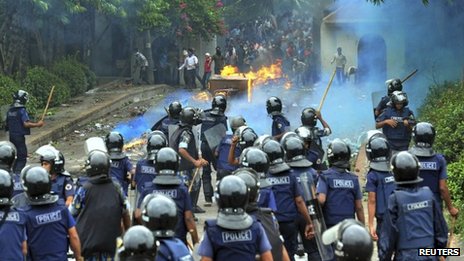
Many garment workers suffer from malnutrition as their wages are too low to afford an adequate diet;
Take Rahima (her real name withheld), for instance. She earns Tk 4,500 a month, and pays Tk 1,000 per month for her one-room shanty. Her landlord now wants Tk 1,400.Wednesday 13th June, Ashulia;
Over the past several months, she had to skip eggs, the almost one and only source of protein for low-income group people.
“Four eggs cost Tk 40 now. When my wages were increased [in late 2010] they cost Tk 24,” she says as she explains why she cannot afford eggs any more.
With such a price spiral, the inflation graph has swung wildly and remains at a high level. On a 12-month average basis, the inflation rate accelerated to 10.76 percent in May, up from 8.67 percent in the same month a year ago, according to the Bangladesh Bureau of Statistics (BBS).
Rahima and her fellow workers were shattered by the skyward journey of inflation.
“The workers did not get any benefit of the pay raise as the house owners increased rents four times a year,” said a worker at Ha-Meem Garment at Ashulia on the outskirts of the capital. http://www.thedailystar.net/newDesign/news-details.php?nid=238726
owners of the factories at Ashulia decided to resume production today upon assurance from the government and labour leaders that there would be no harm to their factories.But, despite yesterday's decision, workers turn up for work at 7.30am to find Artistic Design and many others factories closed. They again block the road and are gradually joined by thousands of workers from 200 other factories. Various barricades are built on main roads with logs and tires. Police use baton charges, water cannon and hundreds of rubber bullets and tear gas canisters in clashes with workers.
The decision came at a tripartite meeting chaired by Labour and Employment Minister Khandker Mosharraf Hossain yesterday afternoon where factory owners and labour leaders were present. http://www.thedailystar.net/newDesign/news-details.php?nid=238127
By early afternoon the workers are dispersed and traffic resumes.
The inability of these 'labour leaders' to deliver yesterday's "assurances" of a peaceful workforce today shows how little they are in control of events on the ground and how self-organised and autonomous from official mediation these struggles generally are. With unions still banned from the workplace strikes are necessarily wildcats by nature, with a limited influence of the marginal union organisations.
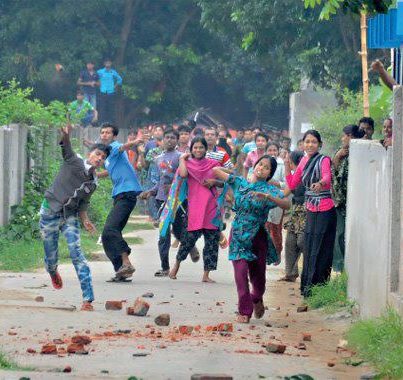
The State Minister for Home Affairs, Shamsul Haque Tuku, said the salary and allowance of the garment workers would be reviewed in the middle of July. He was talking to journalists after meeting representatives of owners and workers. The salary and allowance of the workers are normally reviewed in November. “But, we have decided to review it in the middle of July,” he added. http://www.theindependentbd.com/paper-edition/frontpage/129-frontpage/115463-no-let-up-in-rmg-workers-protest.htmlThe workers are tired of years of broken promises on pay while their bosses grow ever-richer. With their purchasing power declining to new lows, workers are demanding a rise of between Tk 1,500 and 2,000 per month. Currently, a garment worker gets Tk 3,000($36) to 5,500($61) a month.
Some workers told New Age that the workers are not satisfied by assurances only, they want implementation of the new wage scale immediatelyIt is certainly odd and unusual that none of these mysterious "workers’ leaders" or their organisations have been named in news reports.
Shamima Akhter, a worker of a factory of the Ha-Meem Group, said the management of the factory assured the workers that they would increase their wages but did not do so.
Another worker of the factory, Rozina Begum, said that now they only get Tk 4,100 to 4,500 per month by doing general duty. Months before they earned a total Tk 7,000 to 8,000 per month by doing overtime but now they have no overtime duty so they are facing trouble in maintaining their families.
She also claimed that they do not know the workers’ leaders who came here today. They did not come to us to know our demands, they came today to protect the interest of the owner, she said. http://www.newagebd.com/detail.php?date=2012-06-15&nid=13798
"We want to increase our salary as no one can run his family by minimum salaries as the price of commodities increase day by day," Rahima, a knitting operator of a factory told The Independent.Thursday 14th June, Ashulia; the unrest escalates further; during negotiations the government decides to form a committee, headed by the local MP, to hunt down protesters;
... the government formed an inquiry committee ... to identify the mischief makers. The committee was formed at a tripartite meeting of the Labour Ministry and representatives of garments factory owners and workers.As the news spreads that the bosses and the state were more intent on punishment rather than a definite pay settlement furious workers return to the streets, blocking the Dhaka-Tangail and Nabinagar-Kaliakoir highways. The Minister for Home Affairs promises a pay rise next month and monitoring of workers' rents but this is not enough to satisfy workers' demands for immediate concrete improvements. Intense fighting breaks out as the area becomes a battleground, police using tear gas and rubber bullets, but they fail to disperse the workers. There is an attempt to set a factory on fire and over 100 vehicles are damaged, including the torching of a TV channel's microbus (media film crews are becoming regular targets of protesters, as footage is being used to identify demonstrators). Workers make barricades at several points along the highways with burning tires and sewage pipes; in securing their territory, workers take temporary control of most of the area. Another 100 workers are injured. Cops later manage to disperse the occupation.
Ruling party lawmaker Talukdar and the State Minister for Home Affairs, Shamshul Haque Tuku, met protesting workers at Artistic Design Ltd in Narasinghapur at 8:30 am.
...the Bangladesh Garment Manufacturers and Exporters Association (BGMEA) on Thursday threatened to shut all readymade garment factories at Ashulia in Savar if the ongoing workers' unrest is not contained by Sunday.
[...]
“We will close all of our units first at Ashulia and gradually across the country if the violence continues,” Shafiul Islam Mohiuddin, president of Bangladesh Garment Manufacturers and Exporters Association (BGMEA), said at a press briefing yesterday.
He urged the government to take action against the workers who vandalised factories and blocked the roads there for the fourth straight day yesterday.
“A national and international evil power wants to destroy the industry and the government and exporters know who instigated the general workers to do vandalism,” Mohiuddin told the briefing at the BGMEA office in the capital.
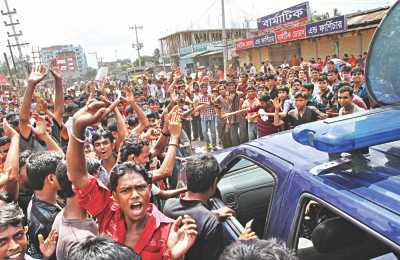
Workers have been promised substantial concessions today by Hameem management, (whose boss is head of the country's Chamber of Commerce) but it's unclear if these apply only to their own workers or will be industry-wide. It's also uncertain whether they will be accepted by the majority of garment bosses - or if the promises will be kept;
Several resolutions were agreed on in the meeting mediated by Tuku.Thurday 15th June, Narayanganj; thousands of garment workers stop work and stage rallies in factories demanding pay rises; some also take to the streets and clash with cops, leaving around 50 people injured. Workers there state they are acting in solidarity with their fellow workers in Ashulia.
Contacted, Brig Gen (retd) Mohammad Ali Mondal, director of the project at Ashulia of Ha-Meem Group, told The Daily Star that the workers would get an increment from next month.
The owners will also pay for the treatment of the injured workers and that the workers will get the full month's salary although production remained suspended for four days, he added.
Also, the workers were promised that the government would see to it that their house rents at Ashulia do not go up further.
Friday 15th June, Ashulia; The unrest continues.
Saturday 16th June, Narayanganj; workers withdraw their labour at 10am; roads are blocked and fierce clashes occur with police, injuring four workers with rubber bullets as workers brick the cops. It takes until 2pm to clear the roads.
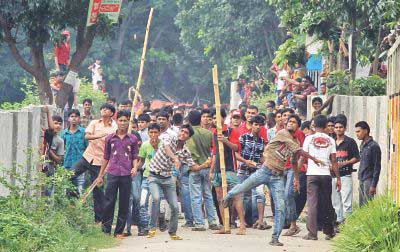
Saturday 16th June, Ashulia; another day of unrest, with 50 injured and roads blocked for several hours. 4,000 police remain stationed in the area.
Exasperated with continued unrest and their massive losses incurred from shutdowns and damages, the factory owners declare an indefinite shutdown from tomorrow, Sunday;
"We are losing production every day. Now, we can hardly tolerate further. So, we have decided to close more than 300 factories in Ashulia area," said BGMEA President Shafiul Islam Mohiuddin at a rushed press briefing at the association's office in Dhaka. ...The Prez continued with a familiar conspiracy theory;
"It won't be possible to reopen the factories until those responsible for the unrest in the industry are given exemplary punishment," BGMEA President Shafiul Islam Mohiuddin told a press conference.
"We will shut all factories across Bangladesh if the situation so demands," he threatened.
The conference followed a meeting of BGMEA (Bangladesh Garment Manufacturers and Exporters Association) and the Bangladesh Knitwear Manufacturers and Exporters Association (BKMEA).
"Considering security of people and the industry, we cannot but shut the garment factories in Ashulia area for an indefinite period in line with Clause 1 of Article 13 of the Bangladesh Labour Act," Mohiuddin said.
If necessary, Mohiuddin said, the government should ensure exemplary punishment to them who are destroying the country's economy by enacting a new law so that no one can play game with the industry.Similar tales of unspecified dark forces conspiring against the industry have been used for years whenever workers unrest occurs; yet there has never been any concrete proof presented to justify such vague claims nor a single prosecution of these mysterious conspirators. The conspiracy claims are used with certain intentions;
He alleged that conspiracy, both from home and abroad, is on to destroy the industry which now has turned into a 5500-factory industry from one factory.
1) to attempt to convince foreign buyers - worried that their Corporate Image will be tarnished by association with sweatshop exploitation - that it is external forces rather than poor internal industrial relations and extremes of exploitation that are the cause of unrest.
2) To blame the convenient bogeymen of neighbouring rival countries; both Pakistan (from whom Bangladeshi national independence was won), pro-Pakistan Islamic Bangladeshis and also rival garment exporter nations such as overbearing big brothers China and India.
3) To target western NGOs whose reformist agenda is to expose the pay and conditions of garment workers[2]. This thorn in the side of the garment industry and its image abroad is generally seen as an embarrassment and as contributing to the present difficulties of convincing the US to grant duty-free access to its markets - the US Ambassador had earlier this month expressed "deep concern" over failure to resolve unrest in the industry.[3] Expressing both garment bosses' image concerns and their enduring paranoia, this has now been taken to the level of absurdity - with UK charity/NGO War on Want and UK newspaper The Observer being blamed as "behind the unrest"!
After reading out a written statement, he blamed a non-governmental organisation (NGO) and a UK magazine for the unrest.
"There is an NGO named War on Want. Besides, The Guardian's magazine The Observer has some influences," he said in reply to a query on who they think were behind the unrest.
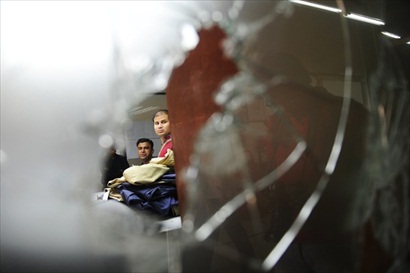
The BGMEA President seeks to give the impression that there are no genuine causes of workers' dissatisfaction, they are merely being led astray by unseen manipulators. Yet his colleague soon confirms that workers are often deprived of their already miserable wages;
Referring to some newspaper reports, BKMEA Vice President Mohammad Hatem said some units of the industry had failed to pay wages.The inflation driving up prices for workers also drives up the price of bank loans for employers with high interest rates of 15%. Prices paid by Western buyers have also fallen in some cases. But, though growth has slowed somewhat since the global recession this is deliberately overplayed; exports continue to grow and to maintain a very profitable industry. But bosses remain reluctant to raise wages;
"The global recession has caused the situation. And it is not possible for us to hike salary in this situation," he added.The concessions promised earlier in the week are, predictably, already being denied;
Mohiuddin said that there was no justification for any increase in the wages of the workers as the owners had increased the wages by 80 per cent in November 2010. [...]The effects of rampant inflation on living conditions are therefore completely ignored. Nor were all grades of employee wages increased by 80% in 2010 - and the increases made then were still insufficient by any humane measure[4]. This is why thousands of workers continued to demonstrate and riot after these increases were set.
The BGMEA president also said that the announcement on pay hike by the state minister for home affairs was an individual decision of the Ha-Meem Group.Sunday 17th June, Narayanganj; after recent unrest in the workplace the Sinha Textile Group announces a two day closure of its factory. Police are deployed to prevent further trouble. Sinha employs 40,000 workers.
‘The Ha-Meem Group advanced its yearly increment from November to July. But this was not a decision of other owners,’ he added.
Sunday 17th June, Ashulia; thousands of workers gather outside the closed factories. They demand an immediate pay rise and immediate reopening of the factories[5]. Barricading the roads, there are more clashes with cops - resulting in 50 people, including cops, injured. Police raid workers hostels and houses and also attack bystanders and shoppers.
Already subject to regular state harassment, leaders of the main opposition BNP party are now also conveniently being blamed for the unrest, with some today charged with the unlikely role of orchestrating the workers' disturbances! Extremely unlikely, as many politicians of both the BNP and the ruling Awami League are owners and investors in the garment industry.
Monday 18th June, Ashulia; 15 workers are arrested in police raids in the Ashulia area. Charges are obstructing police in the discharge of their duty, vehicle vandalism and arson.
A war of attrition
A dispute at one factory employing 4,500 workers becomes, in less than a week, so generalised and intensified in Ashulia that it leads to the drastic measure of the locking out of 500,000 workers from 350 factories by panicked bosses. This shows, once again, the extraordinary solidarity of garment workers that continues to sustain their struggles in the face of such harsh material conditions.With the exception of 'design classics' such as Levi's jeans, fashion commodities have a stylistic built in obsolescence[6]. Since the 1990s, supply processes and consumer behaviour patterns have become more diverse and fast-changing[7]. Catwalk shows, their clothes horse celeb models and latest designs have in recent decades become media phenomena visible far beyond fashion industry insiders, affecting consumer preference. Influenced by supermarkets developing their own cheap clothing lines, "fast fashion" emerged as fashion 'seasons' grew from two to half a dozen a year; speed of supply became an essential component of competition to get versions of the catwalk's latest styles into the shops and onto the racks faster than one's rivals, with a faster turnover through the shorter seasons. Fast turnaround from design drawing to delivery - for the cheapest price - are what Western buyers demand of Asian garment factories. The workers of Ashulia and Narayanganj are fully aware that every day they strike costs their bosses millions in loss of buyer confidence, contract penalty clauses and much increased transport costs of switching to flight rather than boat delivery to make up lost time.
The factory bosses presumably intend to use their lockout to starve the workers back to work on the worst possible terms. But this is a high risk strategy for garment bosses, driven by desperation and the absence of other immediate options. As financial losses accumulate, so does loss of reputation and of reliability in the eyes of international clothing buyers demanding those vital fast turnaround supply times. It seems the lockout cannot be sustained for very long; losses are so far estimated at Taka 500 crore ($75 million) and rising at a rate of $10 million daily.
Once again, the machinists are rebelling against the machine.
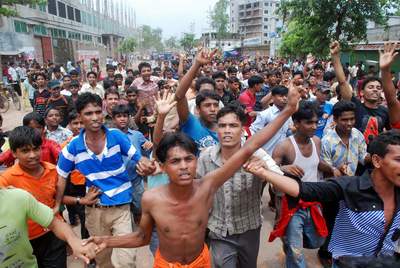
NOTES
1] http://libcom.org/news/return-repressed-new-days-rage-garment-workers-disappeared-27052012
2] As we said previously;
Charities for liberal and regulated forms of exploitation ...3] http://news.priyo.com/business/2012/06/12/us-concern-over-rmg-53339.html
Western NGO's and charities highlight the terrible wages, working conditions and slum housing of garment workers. But they primarily portray them in emotive humanitarian terms as passive victims who only acquire some agency to act in their own interests through the intervention of Western NGO schemes and their lobbying for legal reforms. So the militant class struggles of garment workers are rarely mentioned for what they are - class conflict - but only as tragic and regrettable consequences of an insufficiently regulated industry and 'unethical' consumerism. This ignores the double-edged character of garment workers; while they suffer from extreme exploitation as wage slaves, they are far from simply passive victims. http://libcom.org/library/tailoring-needs-garment-worker-struggles-bangladesh
4] http://libcom.org/news/rage-over-wage-04082010
5] These recent events, and the fact that workers are here demanding to resume work, should be enough to refute the claims of some 'communisation theorists' that Bangladeshi garment workers display a definite 'anti-work ethic' or tendencies and engage in struggles 'without demands'. In several years of observation we have seen no evidence for these claims, which appear to be only a projection of the theorists' ideological preferences/preferred conclusions - of what one wants to find confirmed in events.
6] Nor is cheap clothing made to physically last as clothing- yet much of it ends up with its synthetic fabrics stubbornly refusing to bio-degrade in Western landfill sites.
7] For a short summary, see; http://utexas.academia.edu/VerticaBhardwaj/Papers/577682/Fast_fashion_response_to_changes_in_the_fashion_industry
Also; https://en.wikipedia.org/wiki/Fast_fashion



2 comments:
thanks for making such meticulous records
i want to appreciate jackson west of guaranteetrustloans@outlook.com for helping me to get an urgentloan
i have being scammed total of $6700 by different fake loan lenders and i was at a point of selling my properties to make ends meet. untill i saw a post on the internet on how a friend from germany got her loan from the firm guarantee trust loans and i also applied with same faith. and i got my loan with no stress after agreeing to the repayment terms and conditions of the firm. avoid internet scammers now!
if you are in need for a loan to start up a buisness, car loan, medical bills, projects loans, education etc.
contact the firm guarantee trust loans via email. guaranteetrustloans@outlook.com.
Post a Comment